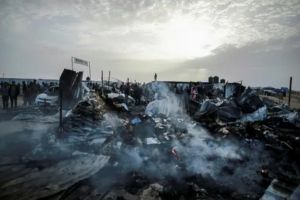The legal fallout of Gaza: An interview with UN Special Rapporteur Ben Saul

Palestinians look at the destruction after an Israeli strike where displaced people were staying in Rafah, Gaza Strip on 27 May 2024
Sydney Black interviews Ben Saul in The Harvard International Review on 2 December 2024:
Professor Ben Saul is the UN Special Rapporteur on the Promotion and Protection of Human Rights while Countering Terrorism and holds the Challis Chair of International Law at the University of Sydney.
In 2022, the number of people forcibly displaced due to conflict, violence, and human rights violations surpassed 100 million. With this number continuing to grow, how would you assess the current global state of human rights?
There are huge pressures and strains on the protection of human rights globally, both in armed conflicts and situations of emergency—including counter-terrorism, but more broadly in societies at peace [as well]. There’s a lot of backsliding on the protection of human rights. There’s increasing authoritarianism in a number of countries, and the geopolitical situation currently—with the conflict involving Russia and Ukraine [and] the politics of the war[s] in the Middle East—[is] really undermining multilateral human rights protections and systems. I encourage all governments to contribute more positively and constructively to the protection of human rights globally, including by criticizing [their] friends and allies when they violate human rights.
…. …. ….
In July, the International Court of Justice (ICJ) issued an advisory opinion stating that Israel’s actions constitute breaches of international law related to racial segregation and apartheid. What role do you think international law and the global community should play in holding states accountable for these violations?
The positive news is that there has been a mobilization of legal tools to bring pressure to bear on both sides and to hold them accountable for violations. [There are] significant votes in the General Assembly condemning Israeli violations and legal actions launched in the International Court of Justice, including a case concerning genocide, a case on arms transfers, [and] an advisory opinion on the larger legal issues underlying the situation. Lots of countries have stopped exporting weapons to Israel. It’s only really two countries that continue to export weapons in a major way: the United States and Germany, which account for 99 percent of arms exports. There have been actions in national courts of various kinds, [and] efforts [by] the UN Human Rights Council.
Of course, the negative is the Security Council is paralyzed because the United States is essentially shielding Israel from any serious consequences. The Security Council is the only part of the United Nations that has binding powers to force states to do things, and if the U.S. is threatening to exercise its veto power, the Council can’t do very much, and that’s a serious indictment on the United States for not doing its job and enforcing international peace and security.
[The United States is], in my view, violating its own obligations under humanitarian law not to export weapons to a state where there’s a serious risk that those weapons would be used to violate humanitarian law, as is the case in not only Gaza, but also Lebanon, given the indiscriminate nature of some of the Israeli operations in that conflict as well.
There’s more room for states to use sanctions. Even without the Security Council acting, countries can unilaterally impose sanctions on any other country, as many countries, including the U.S., have done on countries like Russia and Iran. Given the severity and frequency of Israeli violations, more states should impose targeted sanctions on the responsible political and military leadership of Israel.
That doesn’t mean blanket sanctions on everybody, the whole country, or the economy. It certainly [does] mean those responsible for violations should be targeted through sanctions in the way that we target any other country that is seriously violating human rights. There’s clearly a political problem that—for whatever reasons of domestic and international politics—various countries are not applying the law to Israel as we apply the law to other countries that seriously violate international law.
